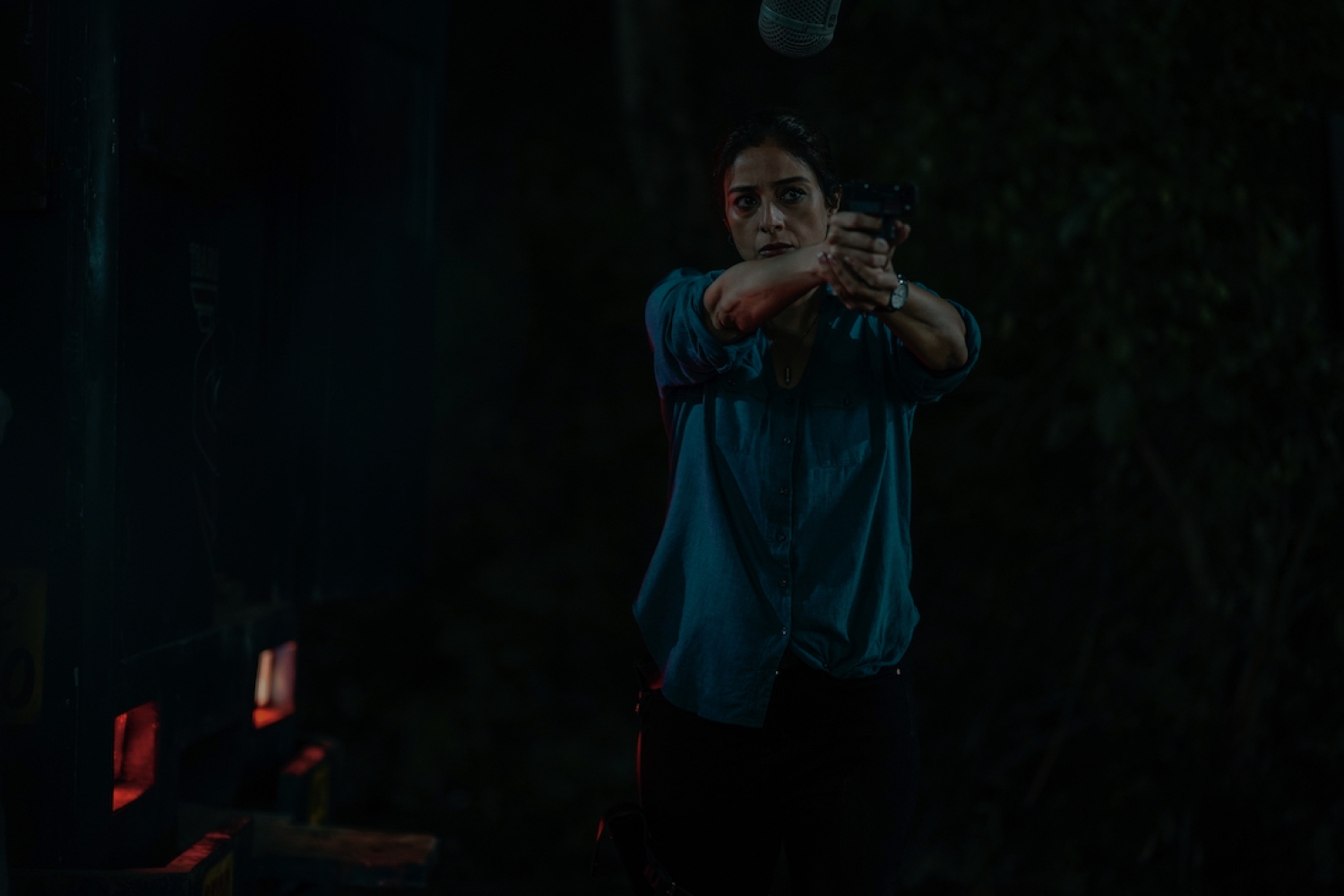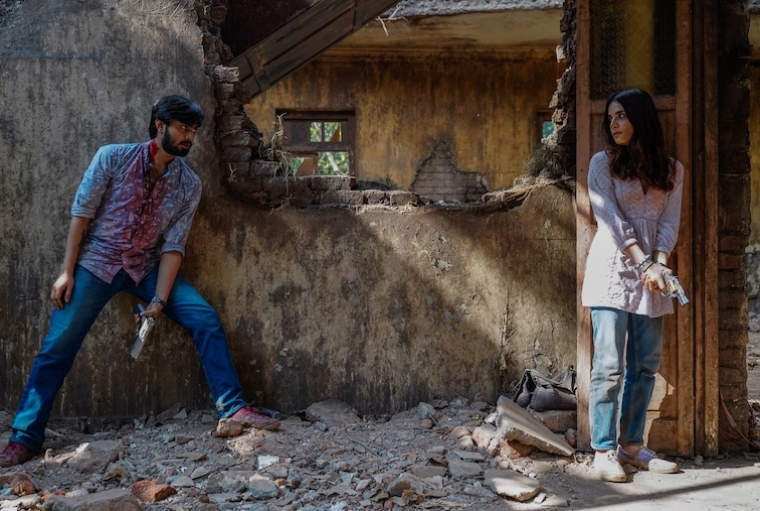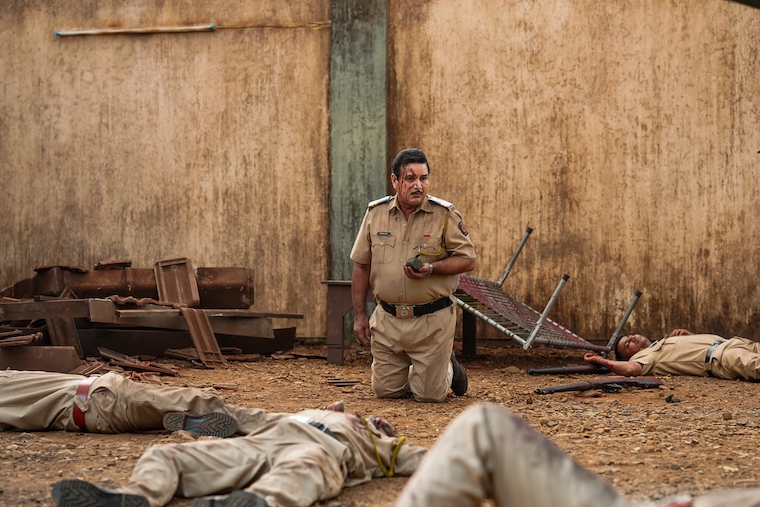

Vishal Bhardwaj made his debut twenty years ago with a film called Makdee. What makes Makdee such a memorable film, even after two decades of release, is its close introspection of the world seen through a child's perspective. It was an enduring tale that had many firsts. Apart from changing Vishal Bharadwaj’s life, it also single handedly changed how kids looked at horror films or rather made kids watch scary films — a genre that was never made for them in the first place. And lastly, it helped a little boy find his calling.
Bharadwaj’s son, Aasmaan found his voice as a filmmaker on the sets of Makdee. “After my father made his first film, things changed forever. I remember I used to be on the set and I just couldn’t leave. And that’s still the case for me. Even till date, if I go on my dad’s set, I can’t leave until they pack up. It was Makdee that changed my whole life journey,” he shares.
He also must be the youngest kid to have ever watched Maqbool when it was made. Aasmaan was introduced to cinema through his father, but honed his craft by diving into cinema at film school. All of the above helped him reach the biggest point in his life — making his debut film, that is now streaming on Netflix. Called Kuttey, it is an action-packed thriller with an insanely talented cast. We got in touch with Aasmaan to understand the making of debut film and everything he has learnt from his father.
What were your favourite films growing up?
I used to watch a lot of Hindi action films when I was a kid. After that, I started watching the films that really shaped my love for cinema. I remember I watched Se7en with all my friends at home on a Sunday when we must have been around thirteen! And I was just blown away. Scorsese’s films became my favourite after a point. The Departed is one of my favourite films. And then there are all the great contemporary filmmakers of that generation — Fincher, Tarantino, Nolan and so many more, whom I started exploring. I got introduced to Kubrick a little late, but Eyes Wide Shut, Dr. Strangelove and A Clockwork Orange really broadened my understanding of deep characterisation. But foreign films were introduced to me mainly after I reached college.
I think after I got introduced to global cinema through the filmmakers I mentioned above, I was more inclined and inspired by that type of storytelling rather than from the Indian film industry at that point. Other than my father’s films, there were only a few other filmmakers whose films I liked, such as Anurag Kashyap, Sriram Raghavan and Vikramaditya Motwane, to name a few. My journey into foreign films began and cultivated because of film school. We were made to watch films and analyse them in class by our teachers, and I am so grateful that I got to go there and experience such films, because they truly changed my perspective of storytelling and made me understand how universal is the need to tell stories. One of my favourite foreign films I watched in college was Murmur of the Heart and I recommend it to anyone who ever asks me which my favourite foreign film is.
What is it about cinema that evokes emotion in you?
I think that everything about cinema is bound to evoke emotion in you, because without emotion there is no cinema. Everything in the realm of storytelling evokes emotion in me. Cinema is not just a conscious experience, it is so subconsciously rooted in my being that I don’t think I would be able to breakdown what it does to me at this age in my life. Maybe when I’ve reached an age and level of maturity where I have such a deep understanding of myself that I can really look within, then I would be able to do justice to such a question.
What kind of narratives do you gravitate towards, and what made you decide to make Kuttey as your debut feature?
I feel really pulled towards characters and stories which are grey in nature. I believe no human ever can be completely white or black as a character, everyone has a shade of grey in them, whether they like to admit it or not. I don’t like films in which the villains are just completely black characters with no rationale behind it, and the films with the opposite of that for heroes, I dislike even more. I think because of this I really love noir and neo-noir films because of the introduction of anti-hero characters in them. I feel that those are real people, real humans that I can see around me, or at least imagine in the realm of reality to be around. Those are the characters that really interest me. Jake Gittes from Chinatown is one of my favourite characters ever.
The reason I chose Kuttey for my debut was because of the grey shades in all the characters — there’s not one character who is completely white or black. I really liked that and I really loved exploring that space. Another thing which drew me to Kuttey was the structure of the screenplay. I began writing it in my last semester of college in 2019 and I remember that my main goal was to not write a heist/caper thriller in the normal way that I’ve seen before. I wanted to try something new, and that’s why I structured the screenplay in such a way. And I had so much fun doing it because of that reason. I don’t think I would have enjoyed the process half as much if it wasn’t for the structure of Kuttey.

You had a big, ensemble cast with such good actors. Can you tell me about your casting process and how was it working with them?
Honestly, casting for this film was one of the hardest parts of the prep for me. Once it was done, I felt so relieved because I knew that seventy percent of my job was done. I can’t remember who, but a great director said that seventy percent of their job is casting, and then it’s just about the logistical execution. Luckily for me, I had the privilege of being able to approach such actors for my first film, but I realised very soon that after that, it all depended on the script. A big benefit for me was that I had written the script myself, and after my father joined me as a co-writer, we worked very closely on each and every scene, so by the time we reached a stage of approaching actors, I knew the script like the back of my hand. I knew each and every character’s motivation, desire, wants and needs, the reason behind each scene being where it is, and each and every beat of the story, and because of me having such a level of clarity at the stage of writing, it gave me even more clarity as a director on what I wanted. I think that really gave the actors the confidence that I wouldn’t be confused or overwhelmed when I reached the set to shoot it.
So, my biggest strength when I was approaching them for narrations or sending out the script for them to read was that I knew that no one else can know this script better than I. I had lived with it for almost three years already! So when I reached the set actually, I was very clear on what I wanted from the actors, and since I had individually already spoken to them all during the prep so much, there were barely any questions about why a character is doing what they’re doing, or saying what they’re saying, or any confusion about what is to happen. Of course, that nervousness from my side was there on the first days of each of these actors, because it was my first time, but luckily, because I had already seen the film in my head a thousand times already, that nervousness disappeared after the first take and I got back to doing my job. Another thing I would say is that because most of these actors were so experienced and had worked with such a diverse range of directors, it really helped me to get my footing with them on my first day because they knew how to handle a young and ambitious first time director.
What has been your biggest learning looking at your father’s illustrious journey in cinema?
I don’t think that there has been a specific learning or one piece of advice that I have taken from my father, because if you think about it, he has technically been mentoring/guiding me since I was that seven-year-old boy, roaming around with a camera made of thermocol and imitating the shots the cameraman would take. But if I were to give a piece advice to anyone that wants to become a filmmaker, that I was given by my father, would be to learn screenwriting. That is the biggest learning that he gave me, because as a filmmaker, you need to tell stories, and to be able to do that you need to become a storyteller. And in the format that we work in, that means you need to be able to write for the screen.
How did your time at a film school enhance your knowledge and how much of it did you apply it on set?
Film school was one of the biggest learnings for me in my journey as a filmmaker! I don’t think I would be able to become a filmmaker had I not gone to film school. Sure, I had my father to ingrain that bug of filmmaking in me, and I learned so much by just being around him and his sets. But if I had not gone to film school, I don’t think I ever would have found out how I like to make films. Film school made me realise how I can showcase my perspective of the world. Like I said in my previous answer, becoming a writer is the most important part of becoming a filmmaker, and my college helped do just that for me. I had chosen screenwriting as my major in my second year, and I couldn’t have asked for anything more.
Being around filmmakers and films all day, what do you do to get a break from work?
I don’t really think that I am ever able to take a break, because even in my breaks I would be watching a film or a show, haha! I think to turn off my mind though, I would say I play golf. It’s my favourite sport and I’m obsessed with it. Other than that I’m really into gaming, I enjoy it a lot as well.
What is keeping you busy now?
I’m working on my next script now! It is drastically different from Kuttey and that excites me a lot. I’m also reading a lot to find more subjects. Other than that, I’m playing golf and enjoying watching new films and shows.
Words Hansika Lohani
Date 29-03-2023
